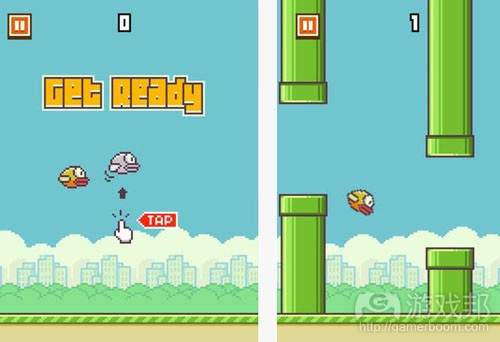从《Flappy Bird》吸取宝贵的经验教训
作者:Itzhak Wolkowicz
大受欢迎的独立游戏《Flappy Bird》最近的成功(以及突然衰败)掀起了一股新的游戏景象——“人们都在讨论着《Flappy Bird》”。在这款游戏占据着iOS排行榜榜单的几周后,我发现没有一天人们不再谈论着这款游戏。同事们一直再说“我们应该向这款游戏学习”;好多人会问我为什么我不自己创造这样的游戏。突然间,《Flappy Bird》成为了下一款《愤怒的小鸟》或《Candy Crush》,但与这些游戏不同的是,《Flappy Bird》是由一个人所创造出来的游戏,即20岁的越南游戏开发者Dong Nguyen。
游戏的迅速成功导致了许多相关文章的诞生—-网站上充斥着这些文章,如:
《What Marketers Can Learn from Flappy Bird?》
《6 Lessons Every Entrepreneur Can Learn From Flappy Bird (R.I.P.)》
《What can executives learn from viral game Flappy Bird?》
《What Flappy Bird’s success can teach the game industry》
《Flappy Bird: What lessons can be learned》
还有其它许许多多的文章。实际上,如果你在谷歌搜索“通过《Flappy Bird》可以学到什么”,你便能够发现一篇名为《What the Church can learn from CVS and Flappy Bird》的文章。尽管我们可以假设大多数文章(显然有些是在游戏攀上排行榜榜首后才写的)多多少少受到了编写有关一个受欢迎的新闻的SEO/SMO价值的影响,不过我想大家应该对这款游戏会一夜成名表示费解吧。每个人都在问—-它是怎么做到的?
不要误解我—-“怎么做到的”是一个合法的问题。向成功的故事学习总是一种明智的做法。但是这是否是我们在此所着眼的内容?对我来说,在这里“怎么做到的”更加明显,并且不一定带有学习愿望,更多地应该是作为一种指控。当一个不知名的越南开发者想办法攀上iOS排行榜最顶端,并且并没有任何市场营销预算可依靠时—-事情看起来便有点奇怪。并且因为实际游戏玩法并非原创的,图像和声音也看似受到了《马里奥》的影响,并且游戏也并未摆脱我们所熟悉的“无尽奔跑”规则—-如此事情看起来更加奇怪了。关于《Flappy Bird》成功的看法多种多样,但在我看来它们并不成立:
“它悍然违抗了所有游戏设计师对此的了解。”
但这是否真的是独特的?尽管我同意看到一款没有升级机制,成就或巧妙的进程曲线的游戏有点惊讶,但情况却并不是这样的。独立空间里充斥着许多带有简单游戏玩法的游戏,它们并不在意盈利和用户留存—-只是基于平平淡淡的乐趣。将游戏的成功归因于每一款基于编程马拉松所创造出来的游戏中的质量并不能让人信服。
这归因于巨大的点击率:这是一款经过优化(尽管是在非常小的范围内以及简单的图像),基于友好型(图像非常“有趣”,明亮),并且其创造者曾经创造过一些较不成功的游戏的游戏—-《Flappy Bird》是基于之前游戏所累积的一些内容而创造出来的。所有的这些都是对的,但却不是只针对于巨大的点击率。
它通过欺骗的方式攀上了顶端—-实际上这款游戏是在半年前发行的,但却直到1月份才开始获得巨大的流量。这种类型的参数是双向的—-如果Dong Nguyen使用了bots,为什么只在现在使用?如果他所做的一切只是为了名誉,金钱和荣耀,他便没有任何理由在游戏达到最高点时将其删除。
这是一次病毒性的突破,当它到达一个临界点时—-它便成为一个热门事物。不要为此感到怀疑—-但如果没有大量的市场营销活动,它又如何到达一个临界点呢?这是个秘密吧?
当《Piou Piou vs. Cactus》于2011年发行时,这些参数都是有效的。《Flappy Bird》看起来就像是这款游戏的复制品(即使这并非它的本意)。《Piou Piou》的确“悍然违抗了所有设计师对此的了解”,并且也是出现在几年前。那么是否有任何人能够解释下为何《Flappy Bird》并未做到这些呢?
从产业角度来看,我们是否能从《Flappy Bird》身上学到什么?如果我们停止专注于游戏本身,而开始专注于我们为何对它如此念念不忘的话会怎样?
也许我们从中所吸取的教训是并不存在一款完美的游戏,复制迭代文化已经衍生出了许多《FarmVille》和《Candy Crush Saga》的复制品(游戏邦注:现在的《Flappy Bird》复制品也不少)。基于个人层面,我们需要不断尝试才有可能创造出下一款能够吸引无数点击的游戏。而基于工作室层面—-它需要创造出最棒的团队并获取足够的经验。这非常接近于我们所明确的热门制造准则,而剩下的就归功于运气吧。
(本文为游戏邦/gamerboom.com编译,拒绝任何不保留版权的转载,如需转载请联系:游戏邦)
Let’s face it – we don’t get it
by Itzhak Wolkowicz
The recent success (and sudden demise) of the highly popular indie-game ‘Flappy Bird’ started yet a new gaming phenomena – ‘people that talk about flappy bird’. Not even a single day passed during the following weeks of his iOS chart dominance where I haven’t heard people talking about the game. Co-workers were saying things such as ‘we should learn from this game’; friends asked me why haven’t I created such a game myself. Suddenly Flappy Bird was perceived as the next Angry Birds or Candy Crush Saga, but unlike those – it was the work of a one man – Dong Nguyen, a 29 years old Vietnamese game developer.
The game rapid success spawned many articles about it – the web is filled with articles such as:
“What Marketers Can Learn from Flappy Bird?”
“6 Lessons Every Entrepreneur Can Learn From Flappy Bird (R.I.P.)”
“What can executives learn from viral game Flappy Bird?” (metaphorically, which is rather funny)
“What Flappy Bird’s success can teach the game industry”
“Flappy Bird: What lessons can be learned””.
And many, many more. In fact, if you Google the term ‘flappy birds can learn’ you’ll even find a blog-post named “What the Church can learn from CVS and Flappy Bird”. While it’s safe to assume most of the articles, notably those that were written just after the game topped the charts, were at least somewhat influenced by the SEO/SMO value of writing about a popular news item – I think most can agree that the overnight success of the game is puzzling. Everyone is asking – How?
Don’t get me wrong – ‘how?’ is a legitimate question. It’s always advisable to learn from success stories. However – is this what we’re seeing here? It seems to me that the ‘how?’ here is a bit more pronounced, and comes not necessarily from a wish to learn, but more as an accusation. When an unknown Vietnamese developer manages to get to the top iOS charts, without a marketing budget – something just doesn’t seem right. As the actual gameplay is unoriginal, the graphics and sounds seems to be heavily influenced by Mario, and the game doesn’t deviate from the ‘endless runner’ formulas we’ve seen so far – things seems even weirder. The opinions regarding FB success varies, and, in my view – doesn’t really hold water:
“it (FB) flies in the face of what every game designer knows at this point.”
But is it really that unique? While I agree it would be a surprise to see a game without upgrades, achievements or an intelligent progression curve – created by a large gaming studio – this is not the case. The indie space is filled with games with simple gameplay, zero care for monetization and user retention – just plain fun. Attributing the game success to qualities that are found in just about every hackathon-produced game doesn’t seem too convincing.
It has attributes that are shared with ‘mega-hits’: it’s polished (although, within its very small scope and simple graphics), friendly (the graphics are ‘fun’, bright) and its creator has experience with previous, less successful titles – FB is based on accumulated knowledge from previous games. All of this is true, but far from being unique to mega-hits.
It has cheated his way to the top – the fact that the game was released half a year ago, and started gaining major traffic only by January does make one wonder. Too bad that this type of arguments goes both ways – If Dong Nguyen used bots, why only now? And if all he wanted was fame, money and glory, he had absolutely no reason to remove the game while it peaks.
It’s a viral breakthrough, once it reached critical mass – it became a hit. No doubt about that – but how did it reach critical mass without massive marketing campaign? This is the secret, isn’t it?
These arguments could have worked great when ‘Piou Piou vs. Cactus’ was released in 2011. Flappy Bird seens like an almost exact copy of that game (even if it wasn’t intended to be one) . Piou Piou ‘files in the face of what every game designer knows’, just as well, and it did it years ago. Can anyone explain why Flappy Bird didn’t work back then?
So can we learn anything, as an industry, from the Flappy Bird phenomena? Probably, if we stop focusing on the game itself, and start focusing on the fact that we are so fixated with it.
Maybe the lesson here is that there is no perfect game, and that that the copy-iteration culture that spawned so many Farmville and Candy Crush Saga clones (and now FB clones as well) won’t necessarily create the next Zynga, King, or even the next Dong Nguyen for that sake. The road to the next mega-hit, at the individual level, is trying and trying again. At the studio level – it’s creating the best team possible and gain experience. This is as close to a hit-producing formula as one can get, the rest is luck.(source:gamasutra)
上一篇:分享开发者执行本土化策略的技巧








































 闽公网安备35020302001549号
闽公网安备35020302001549号